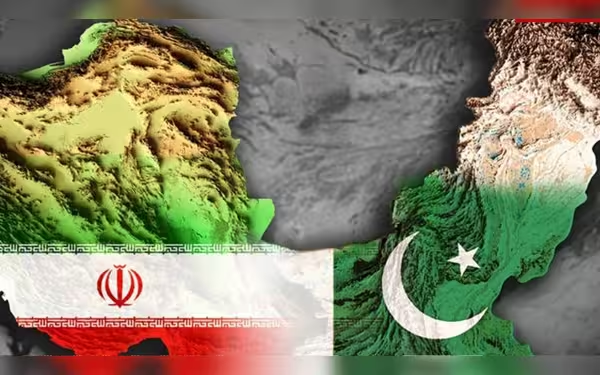Saturday, November 16, 2024 07:45 PM
Strengthening Pakistan-Iran Relations for a Unified Muslim World
- Pakistan and Iran aim for $10 billion trade target.
- Cultural exchanges can enhance bilateral ties.
- Joint ventures in technology and agriculture are essential.
 Image Credits: thefridaytimes
Image Credits: thefridaytimesPakistan and Iran seek to strengthen ties through trade, cultural exchanges, and collaboration for a unified Muslim world.
In recent years, the relationship between Pakistan and Iran has been a topic of significant interest, especially in light of the late President Raisi's visit to Pakistan shortly before his passing. This visit, like many others between the two nations, was marked by grand statements about the shared history and cultural ties that bind them. Both countries have expressed a desire to enhance their trade relations, aiming to reach a target of $10 billion within five years. Additionally, they have committed to collaborating on issues concerning peace and stability in Afghanistan, while jointly condemning the violence in Gaza. These developments are commendable and highlight the potential for a stronger alliance.
However, despite the optimistic rhetoric, tangible progress has been limited. As noted by experts, cross-border trade continues to face numerous obstacles, including a plethora of restrictions and bureaucratic hurdles. This situation calls for a reevaluation of strategies to transform these aspirations into reality. A robust alliance between Pakistan and Iran is not only desirable but necessary, given their overlapping interests and shared ideological perspectives.
To forge a meaningful partnership, a multi-faceted approach is essential. This involves fostering connections across various sectors, including social, cultural, political, and economic domains. One of the most effective ways to initiate this process is by enhancing people-to-people interactions. Encouraging tourism and travel between the two nations can serve as a foundation for building stronger ties. While government-to-government cooperation is vital, it is equally important to prioritize grassroots connections.
Establishing trade, cultural, and professional organizations that bring together individuals from both countries—such as engineers, artists, educators, and businesspeople—can significantly contribute to this goal. Collaborative initiatives, including exchange programs for students and professionals, can facilitate dialogue and understanding. Events like poetry recitals, cultural festivals, and academic competitions can provide opportunities for citizens to engage with one another, fostering goodwill and mutual respect.
Moreover, sports can play a pivotal role in strengthening ties. Organizing joint sports leagues and tournaments can create a sense of camaraderie and friendly competition. A semi-annual football match between national teams could be an excellent starting point, paving the way for broader engagement through various sports.
In addition to cultural exchanges, enhancing trade relations is crucial. Both governments must work towards harmonizing their import and export policies, eliminating trade barriers, and improving transportation links. Establishing financial networks that are resilient to external pressures, such as sanctions, will also be vital. By creating a common market, both nations can benefit from economies of scale, making trade more profitable and efficient.
Furthermore, collaboration in sectors like technology and renewable energy can yield significant benefits. Joint ventures in manufacturing and agriculture can help both countries modernize their industries while addressing challenges like climate change. By pooling resources and expertise, Pakistan and Iran can reduce the financial burden of these investments and enhance their economic resilience.
Ultimately, the foundation of a strong alliance lies in the connections forged between their peoples. Once these bonds are established, political cooperation and government-to-government relations will naturally follow, as the interests of the citizens align with those of their leaders. The historical example of France and Germany illustrates this point; once adversaries, they have transformed into close allies through mutual investment and cooperation.
The potential for a robust partnership between Pakistan and Iran is immense. By prioritizing people-to-people connections, enhancing trade, and fostering collaboration across various sectors, both nations can work towards a future marked by peace, prosperity, and mutual respect. The time has come for both countries to invest in each other and realize the promise of a closer relationship, ultimately benefiting not only their citizens but the broader Muslim world as well.













